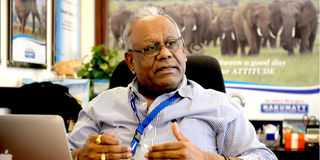Premium
Revealed: Nakumatt CEO left banks with worthless security

Atul Shah, Nakumatt's former CEO.
What you need to know:
- This means that the banks offered Nakumatt billions of shillings on the strength of the retail chain’s cash flow.
- The High Court was told that some banks will lose the security once Bank of Africa auctions the property on August 24.
- The court was not told the specific banks that could lay claim to the Sh2 billion property.
It has emerged that former Nakumatt CEO, Atul Shah, used a single property to borrow from multiple lenders in a scheme that risks leaving some banks holding onto non-existent security.
Bank of Africa had won claim to the Sh2 billion property in court and will auction the asset on Monday to recover Sh700 million advanced to the collapsed retailer.
But evidence produced before High Court judge Mary Kasango indicates that the property was used as security to tap loans from other banks.
“The charged property is also charged to other banks and if the plaintiff does sell the same all other creditors stand a chance of losing their security and that the defendant bank is well secured by the charge over the charged property,” Mr Shah said in court papers.
This means that the banks offered Nakumatt billions of shillings on the strength of the retail chain’s cash flow.
Mr Shah used his company Collogne Investments, which owned the Sh2 billion property in Nairobi, as Nakumatt’s guarantor to the multiple bank loans.
This ensured that the banks did not hold the property title as security because the main charge to the loans was the collapsed retailer.
The High Court was told that some banks will lose the security once Bank of Africa auctions the property on August 24.
Nakumatt closed shop in January with debts estimated at Sh30 billion -- including Sh18 billion to suppliers, Sh4 billion to commercial paper holders and the rest to banks, who are more aggressive in pursuing their unpaid loans.
The court was not told the specific banks that could lay claim to the Sh2 billion property.
But regulatory filings indicate that Nakumatt owed DTB Bank Sh3.6 billion, Standard Chartered Sh900 million, KCB Sh1.9 billion, Bank of Africa Sh328 million, UBA Sh126 million and GT Bank Sh104 million.
Mr Shah says in court papers that some lenders offered Nakumatt loans with an eye on his properties, arguing that the banks were reluctant to support its rescue plan.
"That I believe that if the facilities were not disbursed with the singular agenda of deliberately burdening the borrower beyond the point of return (sic) and therefore appropriating the applicant’s subject property then the respondent ought to have committed to the rejuvenating of the borrower’s operations," Mr Shah said in a court affidavit.
Creditors of the supermarket chain on January 7 voted to wind it up after it failed to repay debts following a failed rescue attempt.
Recover billions
After the vote, banks owed billions of shillings by Nakumatt started to identify properties and bank accounts linked to Mr Shah, especially outside Kenya, with a view to seizing and recovering billions of shillings owed to them.
The local assets include shopping malls, office blocks and prime land in Nairobi, Mombasa and Nakuru — where Atul’s father started Nakumatt as a retail shop.
The properties are owned by third parties linked to the Shah family, which holds the bulk of Nakumatt shares, according to a document prepared by the retail chain’s court-appointed administrator.
The Directorate of Criminal Investigations’ Anti-Banking Fraud Unit is also investigating Nakumatt over alleged theft and money laundering.
In its heyday, the company, which began life as Nakuru Mattresses, had more than 60 outlets across Kenya, Uganda, Tanzania and Rwanda, before it was brought down by poor management and debtfuelled rapid expansion.
However, its financial problems led to empty shelves and store closures that eventually culminated in the demise of the once leading supermarket chain.
Foreign investors could have helped overhaul management and injected cash, but despite a swarm of suitors, no deal was made in the end.





